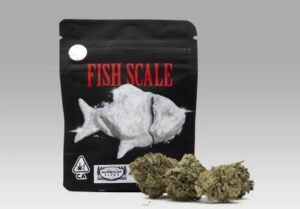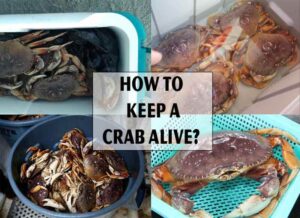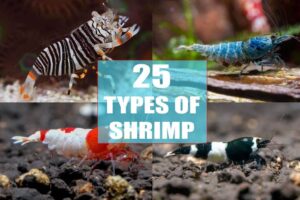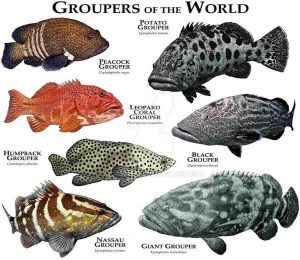Can You Eat Jellyfish? Yes! You can slice and eat them, just like you would eat other fish. There are many ways to eat jellyfish. You can eat them raw, sliced thinly, or boiled. You can even eat them with noodles. But be careful: not all types are suitable for human consumption.

Can You Eat Jellyfish
If you’re curious about whether you can eat jellyfish or not, you are not alone. While jellyfish is not a natural food, it is packed with nutrients. It contains iron, which is necessary for transporting oxygen to the tissues in the body. And choline, a component of cell membranes that produces energy.
What Is Jellyfish?
Jellyfish are free-swimming marine creatures. They feed on tiny sea creatures and also can live in freshwater. Some jellyfish live on algae, which they feed on to gain nutrients. Jellies are recognizable by their soft bell-shaped body and long, poisonous arms at the base of their bodies.
While jellyfish do not have hearts or brains, they do have a stomach-like organ called the coelenteron. This organ contains large amounts of enzymes. The cells in this organ break down food and spit it out. Because jellyfish have no anus or circulatory system, the waste from a meal is disposed of through the mouth. Unlike humans, jellyfish do not have these organs. So they are only able to digest a small amount of food.

What Is Jellyfish
Besides eating algae, jellyfish also eat small creatures. The smaller ones eat algae and zooplankton. The larger ones feed on fish, crustaceans, and other aquatic animals. Despite their name, jellyfish do not actively seek out humans to attack. The sting is a defense mechanism they possess. They use it to capture prey that they want to consume.
Maybe you also like: How to Fish With Clams As Bait? What Fish Eats Clam
Can You Eat Jellyfish?
Can You Eat Jellyfish? “yes”. Jellyfish have a delicious, unique flavor and can be used in recipes. However, before you make your first jellyfish meal, be sure to check the local poisonous jellyfish guide! While jellyfish may be tasty and fun, they are not for everyone.
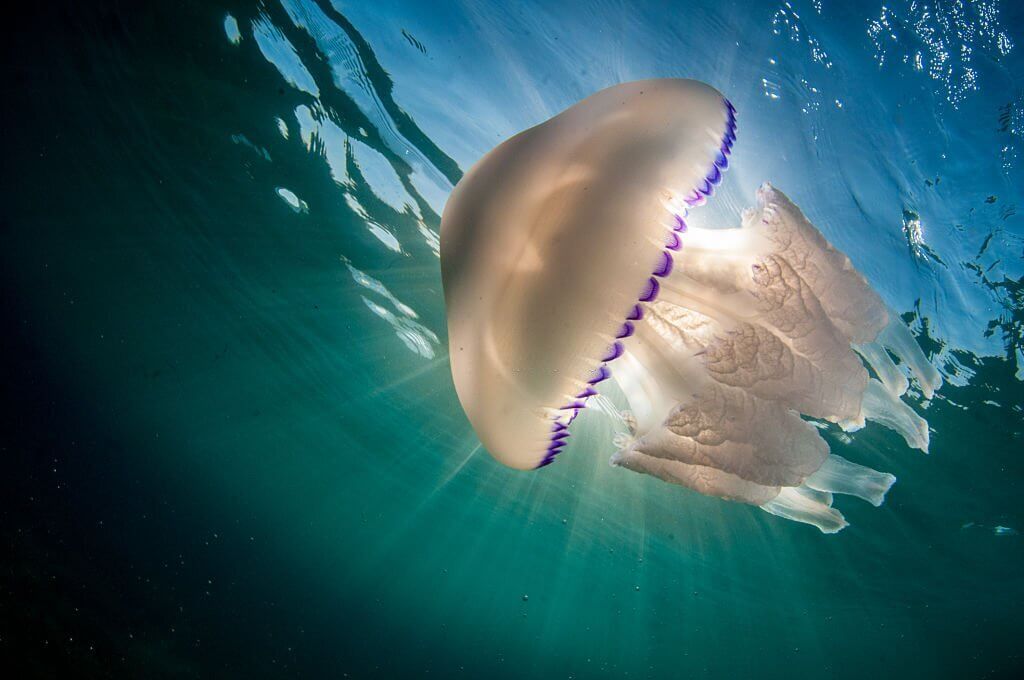
Can You Eat Jellyfish
There are several ways to eat jellyfish. You can grate or shred them, or you can boil or blend them into noodles. There are many other ways to eat jellyfish. Find out what your favorite type of jellyfish is and try it out. Some species are more edible than others. So you’ll likely have no problem eating one. As with any food, make sure you choose a species that doesn’t have a high venom content.
Is It Safe To Eat Jellyfish?
The answer to this question, “Is it safe to eat jellyfish?” depends on what types you eat. In Asia, jellyfish are popular as food. However, it has some drawbacks. Among them are a high level of mercury and aluminum. Eating jellyfish may result in the development of Alzheimer’s. In addition, consuming jellyfish stings can lead to severe skin irritation, rashes, or coma. However, you should ideally soak the meat of the jellyfish overnight to reduce the amount of salt.

Is It Safe To Eat Jellyfish
There are many types of jellyfish. Some are edible and nutritious, while others are not. These varieties contain various amino acids. The majority of the edible jellyfish contain the amino acid glycine. Some jellyfish species are edible in Australian waters. They are low in calorie levels and have high protein levels.
Maybe you also like: What Fish Tastes Like Lobster? The Poor Man’s Lobster
Can Vegans Eat Jellyfish?
If you are a vegan, you might be surprised to learn that jellyfish are edible. Most are low-fat and packed with vital nutrients. In addition to being a source of protein, jellyfish contain omega-3 and omega-6 fatty acids. They are also rich in magnesium, calcium, phosphorus, and other essential minerals. As a result, jellyfish are an excellent food source for vegans.

Can Vegans Eat Jellyfish
Although jellyfish are not fish, they are related to corals and anemones. Since they do not have a central nervous system or vertebrate brain, they do not feel pain. However, many people enjoy eating them anyway, and they can be eaten in various ways. Jellyfish are also delicious. You can eat them raw or add soy sauce to give them a more earthy flavor.
Can You Eat Jellyfish Raw?
While it’s possible to eat jellyfish raw, there are several safety concerns about this creature. Jellyfish are very susceptible to spoilage at room temperature. They need to be processed quickly and carefully to ensure their safety. Additionally, the type of jellyfish you choose to eat is important as some may be harmful to your health. Here are a few tips for safely enjoying jellyfish.

Can You Eat Jellyfish Raw
To eat jellyfish, first make sure it’s desalted. Rehydrating the fish reduces the salty flavor and improves the texture. The taste is delicate and crunchy. So, you can use it in various ways. It’s also great for shredded or sliced thin and mixed with salad ingredients. You can also boil and mix with vegetables or meat. You should never eat jellyfish raw and don’t expect to find a good texture.
Maybe you also like: What is the Most Expensive Fish to Eat?
Nutritional Benefits Of Jellyfish?
A recent study conducted by the European Commission examines the nutritional benefits of some varieties of jellyfish for human consumption. Its numerous health benefits include collagen, a major source of protein, and antioxidants. Jellyfish have also become a popular food in Japan and Korea. There are about 12 edible species in these countries.
The protein in jellyfish is almost entirely collagen. This makes it a great source of calcium. In addition, it stimulates collagen production, which helps age skin. Because jellyfish are low in calories, they are a healthy snack or addition to your diet. You can cook them yourself, or make a dip or soup with them. You can also boil them to remove the salt and add a crunchy texture. Despite their low-calorie and high-nutrient content, jellyfish are packed with antioxidants and essential minerals. Therefore, they are a healthy addition to your diet.
Health Benefits Of Jellyfish
Among the health benefits of jellyfish are its phosphorus, magnesium, and calcium content. It also has polyunsaturated fatty acids. This reduces the risk of cardiovascular diseases and promotes brain function. It is also rich in choline and collagen. Jellyfish are low-calorie foods that are rich in omega-3 and omega-6 fatty acids and protein. This makes them an excellent source of essential nutrients for your heart.
Excellent Source Of Selenium
One excellent source of selenium is jellyfish. This marine animal is packed with selenium, a vital mineral. It supports several vital processes in the body. Selenium also lowers the risk of developing heart disease, cancer, and Alzheimer’s. In addition to selenium, jellyfish are also high in collagen. Collagen is a protein that improves the structure of the skin and bones. Research has shown that people who consume more collagen regularly report reduced joint pain and improved skin elasticity.
High In Choline
Did you know that jellyfish contains 10% of the Daily Value (DV) of choline? Its benefits include supporting the nervous system, metabolism, and DNA synthesis. It’s low in calories and contains no carbohydrates. But it does contain proteins that promote healthy muscle function. A calcium-binding protein found in jellyfish is helpful in memory building. It also improves memory over time. Studies have also shown that jellyfish may help reduce the risk of dementia and Alzheimer’s.
Good Source Of Collagen
While it’s still a controversial topic, there are some positive signs for collagen supplements derived from jellyfish. In a study, researchers found that the substance contains similar anticancer properties as collagen from mammalian sources. It also has the potential to act as an antioxidant, which helps to neutralize harmful chemicals.
Maybe you also like: Can You Eat Fish Scales? Is It Safe To Eat?
Potential Risk Associated With Jelly Fish Consumption Due To Processing
Jellyfish products are made in a variety of ways. But one process in particular poses a possible risk to human health. This process involves the use of alum. This is not healthy for the body. This may cause inflammatory bowel disease and Alzheimer’s. Jellyfish processing must be done quickly and carefully to avoid harmful effects. Selecting an edible species of jellyfish is vital to avoiding the risk of health problems.
Jellyfish are vulnerable to bioaccumulation, a process by which harmful substances accumulate inside the organism. In particular, these species are susceptible to pesticides, hydrocarbons, and heavy metals. Because of this, jellyfish should be caught in the open ocean, far away from estuaries, to avoid contamination. A further risk associated with jellyfish consumption is the possibility of cancer.
What Does A Jellyfish Taste Like?
When you eat jellyfish, do you expect it to taste like a strange fishy flavor? Jellyfish are not particularly tasty, but they are safe to eat as long as you take proper precautions. This article will discuss the various ways to prepare the meat of jellyfish. Regardless of the preparation method, jellyfish are safe to eat if they are bought from a good source and frozen after harvesting.
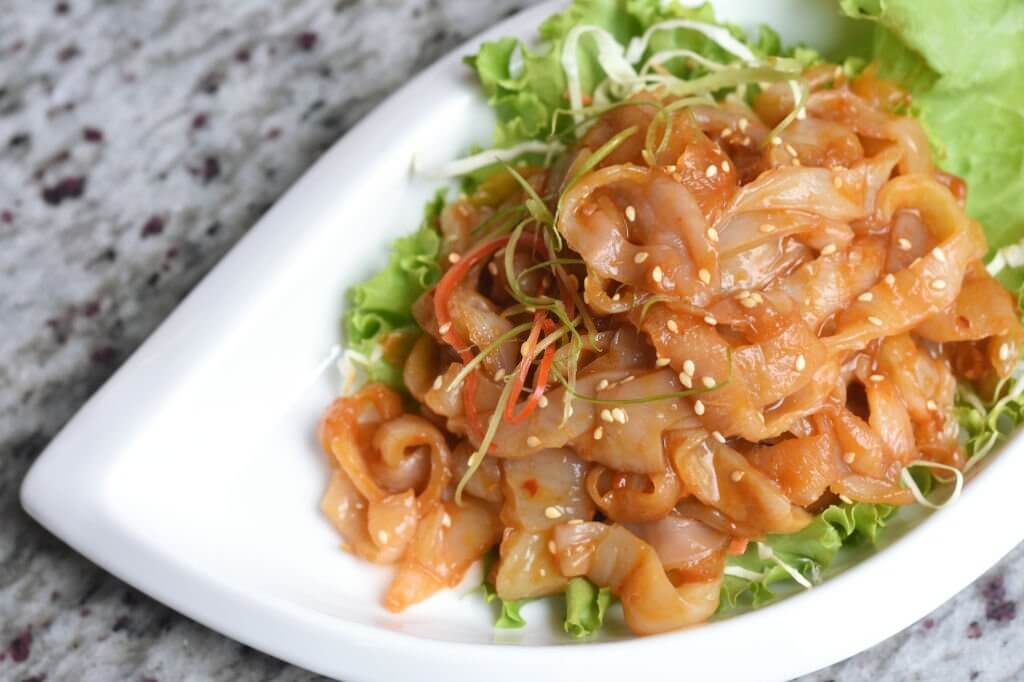
What Does A Jellyfish Taste Like
When cooked in various ways, jellyfish take on the flavor of the sauce or ingredients added to it. Its saltiness is retained through curing. But when combined with spices, such as garlic and chili flakes, it takes on a unique flavor. Jellyfish are chewy on the tongue. They have a flavor similar to beef tendon. This texture makes it a popular addition to Asian dishes. However, it is not recommended to eat jellyfish raw if it is still a bit slimy.
How Can You Clean Jellyfish To Eat?
You may wonder how to clean jellyfish to eat. You can do this by soaking them in water until they become softer. Then, you can cut them into thin strips and marinate them or fry them. Jellyfish are commonly found in both warm and cool waters. They have stinging tentacles to protect themselves from larger sea creatures. Most jellyfish are not poisonous and may be eaten either raw or cooked. The most popular part of jellyfish is the calamari-like ring.
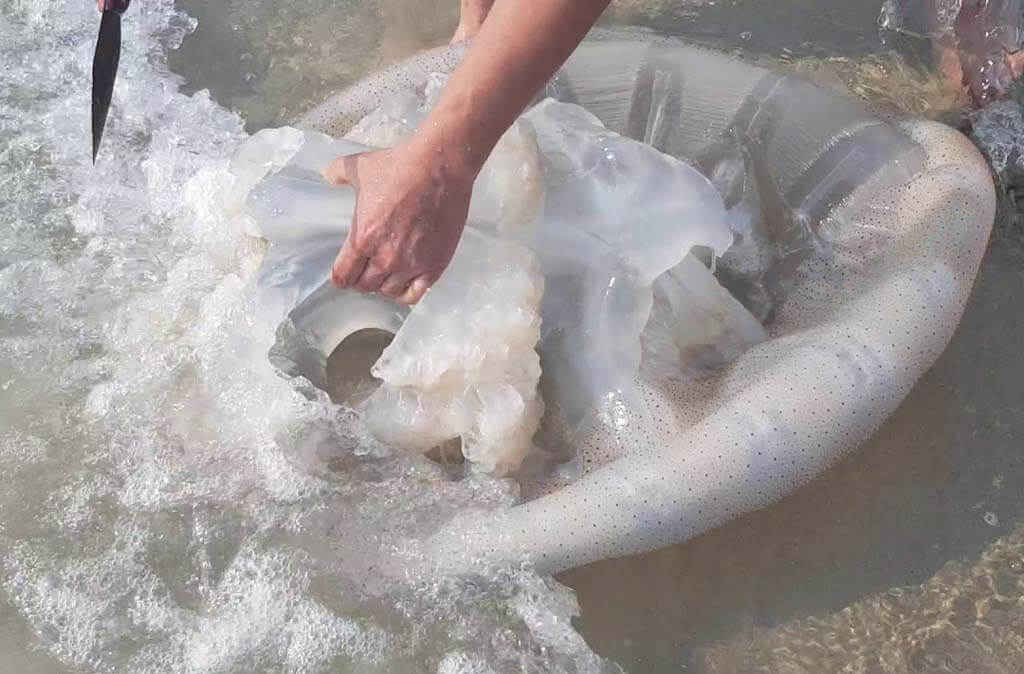
How Can You Clean it
If you plan to cook jellyfish, make sure that you thoroughly drain them. Season them with salt and pepper. Then place them in the refrigerator for about an hour. Stir them before serving. If you can’t wait, chill them in the freezer for 10 minutes. You can also sauté them in a pan until they are completely tender. You can also add them to hot buttered toast if you wish.
Can You Eat Jellyfish When Pregnant?
Can you eat jellyfish while pregnant? Well, it depends on your situation, but the answer is yes. Although it’s not advisable to eat jellyfish in its entirety while pregnant. A dish made of this seafood contains a lot of good nutrients for both mother and child. It also has positive effects on skin health and the overall look and feel of an unborn child. And if you don’t have a problem with seaweed, jellyfish may be a great choice during pregnancy.
If you’re not sure whether the jellyfish is safe for consumption while pregnant, you should make sure that you cook it thoroughly. Even if you cook it, the stingers may still be active. It’s best to remove tentacles and wash the jellyfish under running water. If you feel uncomfortable eating it, you can cut it into bite-size pieces and consume it.
Maybe you like: What Is A Baby Fish Called? How They Avoid Predators
How To Cook Jellyfish?
Before cooking jellyfish, you should clean them well. Cut them into thin strips, about 1/4-inch thick. Then soak them overnight in cold water. After soaking, rinse them under cold water. Repeat this process a couple of times. Then, rehydrate them by soaking them in fresh water. To cook, boil the strips in a pot of water to 190 degrees Fahrenheit (90 degrees Celsius). After the jellyfish are cooked, plunge them in ice-cold water to stop cooking.

How To Cook
Then, thoroughly drain and season the jellyfish. If possible, chill them for about 15 minutes to keep them from becoming soft. After this time, squeeze them as dry as possible. If you want to cook them quickly, you can prepare them in advance. After marinating, you can cook them immediately or refrigerate them. The juices from the jellyfish should be discarded. This juice may contain harmful bacteria. Once cooled, simply boil them for about 15 minutes.
Is Jellyfish Poisonous?
Many people wonder, “Is jellyfish poisonous?” While they may be dangerous, it is vital to know that jellyfish are important for our oceans. Jellyfish have basic nervous systems and can produce venom. These venoms can paralyze their prey. Jellyfish are essential to our ecosystem because they keep the zooplankton population in check.

Box jellyfish are the most venomous jellyfish. They have tentacles that can stretch up to ten feet long. They are mainly found in waters off the coast of Australia. The smallest jellyfish, cannonball jellies, are tennis or soccer ball-sized blobs with a reddish-brown pattern. While these jellyfish are poisonous to humans, they rarely sting people.
Conclusion About Eat Jellyfish
Despite the controversial claims of eating jellyfish, recent research suggests that it is safe to eat. According to research, consumption of jellyfish is safe for allergic people and the organoleptic properties are acceptable. Consuming jellyfish is not advisable for people with high cholesterol. It is also not advisable for those suffering from heart disease.
Although not endangered, jellyfish may cause problems for fish hatcheries and beaches. They can also kill large amounts of marine life. To keep the population under control, eating jellyfish can contribute to a healthy environment.



